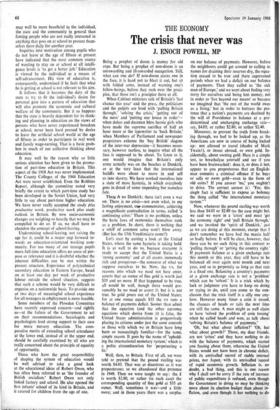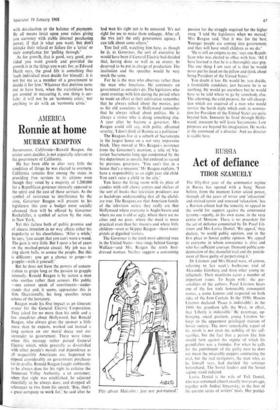The crisis that never was
THE ECONOMY J. ENOCH POWELL, MP
Being a prophet of doom is money for old rope. But being a prophet of non-doom is an unrewarding and ill-rewarded occupation. Still, what can one do? If non-doom stares one in the face, it is hard not to blurt it out, but sit with folded arms, instead of warning one's fellow-beings, before they rush over the preci- pice, that there isn't a precipice there at all.
When Cabinet ministers talk of Britain's `last chance this year' and the press, the politicians and the pulpits are loud with `puffing Britain through,' solving the crisis,' getting out of the mess' and `putting our house in order'— when dukes and dustmen bless heroic girls who have made the supreme sacrifice of half an hour more at the typewriter to 'back Britain,' when Members of Parliament and newspaper proprietors exhume the `buy British' slogans of the inter-war depression—it becomes neces- sary, however tactless, to inquire what all the fuss is supposed to be about. To listen to it, one would imagine that Britain's only army actually was on the beaches at Dunkirk, or at the very least that the international bailiffs were about to move in and sell us into slavery. We have worked ourselves into a state of mass hysteria, in which everybody goes in dread of some impending but nameless fate.
There es no Dunkirk; there isn't even a war on. There is no crisis—not even what, to my lasting enjoyment, ono commentator, achieving a magnificent contradiction in terms, called `a continuing crisis.' There is no problem, unless the basic laws of economics themselves rank as a problem. In short, there is nothing that a whiff of common sense won't blow away. (But has the 13th Venddmiaire come?) Let's start by casting a look at the United States, where the same hysteria is taking hold.
It is as well to do so, because everyone is ready to accept that the United States is a 'strong economy' and at all events immensely rich and prosperous—the converse of what we suppose ourselves to be. Now, the us, for reasons into which we need not here enter, asserts that an ounce of fine gold is worth just $35 and no more. If that happened to be true, all would be well, though there would pre- sumably be no need to assert it; but it is not true. So gold pours out of the United States; for at one ounce equals $35 the us runs a balance of payments deficit. Sooner than admit that the equation (and the other currency equations which derive from it) is false, the United States administration is progressively placing its citizens under just the same controls as those with which we in Britain have long been so nauseatingly familiar—for the same, simple reason. It goes by the name of `uphold- ing the international monetary system,' which is a polite circumlocution for `perpetuating a lie.'
Well, then, to Britain. First of all, we were told to pretend that the pound sterling was worth $4.03. That was as disastrous as it was preposterous; so we abandoned that pretence in 1949. Then we were taught to say: the f is worth $2.80, or rather (in each case) the corresponding quantity of fine gold at $35 an ounce. Well, sometimes it was—and a little more; and in those years there was a surplus on our balance of payments. However, before the neighbours could get around to calling us names for draining their reserves dry, the equa- tion ceased to be true and there supervened periods when we had a deficit on our balance of payments. Then they called us 'the sick man of Europe,' and we went about feeling very sorry for ourselves and being lent money, not in order to `live beyond our means' or because we imagined that `the rest of the world owes us a living,' but in order to buttress the pre- tence that a nation's payments are destined by the will of Providence to balance at a pre- determined and unchanging exchange rate— say, $4.03; or rather $2.80; or rather $2.40.
Moreover, to prevent the truth from break- ing through, we had to be locked up, as the Americans are now in course of being locked up: not allowed to travel (shadei of Mark Twain!), or invest abroad, or own gold. In- cidentally, about owning gold. Here is a simple test, to breathalyse yourself and see if you have been brainwashed : does it, or does it not, appear to you preposterous that an English- man commits a criminal offence if he buys or sells or owns gold—even in the form of old coins? If you answer 'no,' you oughtn't to drive. The correct answer is: `Yes; this single fact is sufficient to expose as boloney the thing called "the international monetary system."' Now, whenever the pound sterling was worth less than $4.03 or $2.80 (as the case might be), we said we were in a `crisis' and must 'get the economy right' and 'pull Britain through,' and we invoked the `spirit of Dunkirk,' just as we are doing at this moment, except that I don't remember we have had the mania half so badly before. It will be clear, however, that there can be no such thing in this context as `pulling through' or `getting the country right.' If payments balance at a given exchange rate this month or this year, they still have to be balanced all over again next month and next year, and so in perpetuity as long as that rate is a fixed one. Balancing a country's payments at a given exchange rate is not a `problem' which can be `solved.' It is a trick which by luck or judgment you have to keep on doing or trying to do, until you come to the con- clusion that the trick itself is a silly one any- how. However many times a coin is tossed, the chances of heads or tails the next time are still the same. A man might as well claim to have `solved the problem of coin tossing' when he called heads and won, as talk about `solving Britain's balance of payments.'
`Oh, but what about inflation?"0h, but what about growth?' Those, my dear friends, are not 'crises' and they have nothing to do with the balance of payments, which started you fussing about them, otherwise the United States would not have been in chronic deficit, with its unrivalled record of stable internal prices, nor Japan, with its unrivalled record of rapid economic growth. Inflation is, no doubt, a bad thing, and this is one reason why I shall not be sorry if the rate of increase of public expenditure is reduced, even though the Government in doing so may be thinking more about its election budget than about in- flation, and even though it has nothing to do with devaluation or the balance of payments. By all means insist upon your rulers giving you currency with stable internal purchasing power, if that is what you want; but don't mistake their refusal or failure for a 'crisis' or their compliance for 'pulling through.'
As for growth, that is good, very good, pro- vided you want growth and provided the growth is in the things you want; for, as Edward Heath says, the good life is something that 'each individual must decide for himself: it is not for me as a member of a government to decide it for him.' Whatever that decision turns out to have been, when the statisticians have got around to measuring it, one thing is cer- tain: it will not be an 'economic crisis,' nor anything to do with an 'economic crisis.'



































 Previous page
Previous page